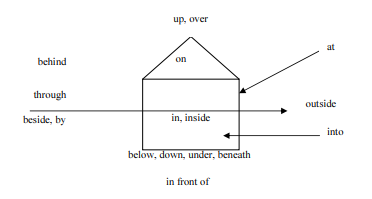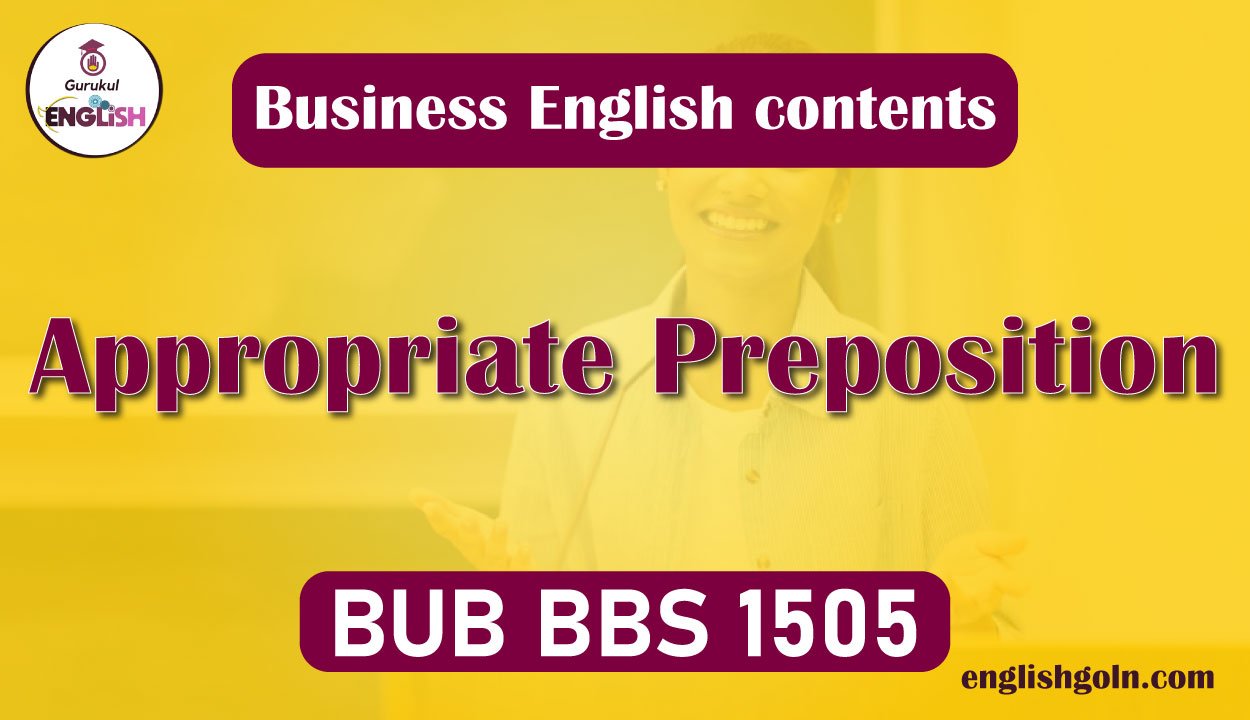Today is our topic of discussion-Appropriate Preposition
Appropriate Preposition
Pre = পূর্বে, Position অবস্থান। সুতরাং Preposition = পূর্বে অবস্থান। Preposition সাধারণত noun বা Pronoun এর আগে বসে। নিচের বাক্যগুলো লক্ষ্য করুন-
I bought a book for you (আমি তোমার জন্য একটি বই কিনেছিলাম)
She lives with me. (সে আমার সাথে থাকে)
উপরের প্রথম বাক্যের for শব্দটি book এবং you এর মধ্যকার সম্পর্ক বুঝাচ্ছে। দ্বিতীয় বাক্যে with শব্দটি live a me এর মধ্যকার সম্পর্ক স্থাপন করেছে। এই for এবং with হলো preposition বা পদান্বয়ী অব্যয়। যে শব্দ বা word কোন noun বা pronoun এর আগে বসে Sentence এর অনভূতি অন্য কোন word এর সহিত
উহার কি সম্বন্ধ তা বলে দেয়, তাকে Preposition বলে।
উদাহরণ : for (জন্য), with (দ্বারা, সঙ্গে), at ( এ, তে, প্রতি), on (উপরে), of (র, এর), by (দ্বারা, লিয়া, পার্শ্বে, কর্তৃক), from (হতে), before (পূর্বে), about (সম্পর্ক), after (পরে), off (দূরে), between (দু এর মধ্যে), under (নীচে), down (নীচে), behind (পিছনে), upon (উপরে), outside ( বাহিরে ), among (অনেকের মধ্যে), near (নিকটে), into (মধ্যে), over (উপরে) প্রভৃতি Preposition (পদায়ী অব্যয়) হিসাবে ব্যবহৃত হয়।

Preposition সাধারণত হয় (৬) প্রকার। যথা:-
(i) Simple Preposition : ইহা সাধারণতঃ একটি শব্দ দ্বারা গঠিত হয়। যেমন: at, by, on, in, with, of, from, off, after
ইত্যাদি।
(ii) Double Preposition : যখন দুইটি Simple Preposition যুক্ত হইয়া একটি Preposition-এর ন্যায় ব্যবহৃত হয় তখন তাহাকে
Double Preposition বলে। যেমন: upon (up+on), into (in+to) ইত্যাদি।
(iii) Compound Preposition: Noun, Adjective Adverb- Simple Preposition যুক্ত হইয়া যে Preposition গঠিত হয় তাহাকে
Compound Preposition বলে। এক্ষেত্রে সাধারণত: on এর হলে a এবং be এর স্থলে by হয়। যেমন-
across = on (a) + cross
along = one (a) + long
behind = by (be) = hind
before = by (be) + fore
without = with out
(iv) Phrase Preposition : দুই বা ততোধিক Word যখন সর্বদা একত্র থাকিয়া একটি একক Preposition-এর ন্যায় ব্যবহৃত হয়
তখন তাহাকে Phrase Preposition বলে। যেমন: in front of, on account of, for want of ইত্যাদি।
(v) Participle Preposition : কতকগুলি Present Participle বা Part Participle. Preposition-এর ন্যায় ব্যবহৃত হইয়া থাকে।
ইহাদিগকে Participle Preposition বলে। যেমন: Considering, regarding, during ইত্যাদি।
(vi) Disguise Preposition : Disguise অর্থ ছদ্মবেশ। কখনও কখনও এবং যথাক্রমে on এবং of এর
পরিবর্তিত আকারে প্রকাশ পায়। ইহাকে Disguise Preposition বলে। যেমন-
He went a (on) hunting (ona)
It is ten o’ (of) clock ( of o)
নিম্নে বিভিন্ন ধরনের Preposition উদাহরণসহ আলোচনা করা হল ::
1. At, in: বড় স্থান বা সময়ের পূর্বে in এবং ছোট স্থান বা সময়ের পূর্বে At বসে।
He went there at 8 o’clock in the evening.
He lives at Rupsha in Khulna.
2. In, into কোন কিছুর ভিতরে অবস্থিত বুঝাতে বা স্থিতিশীলতা বুঝালে in এবং ভিতরে প্রবেশ বা গতিশীলতা এবং রূপাস্তুরিত হওয়া বুঝালে into বসে। They entered into the room. The students are in the room.
3. On, in, at দিন বা তারিখের পূর্বে on, মাস বা বছরের পূর্বে in এবং নির্দিষ্ট সময়ের পূর্বে at বসে ।
I shall meet you at 5 o’clock on Sunday in January.
4. In to on সীমার মধ্যে বুঝাতে in, সীমার বাহিরে বুঝাতে to এবং সীমার উপরে বুঝাতে on ব্যবহৃত হয়।
যেমনঃ
Dhaka is on the Buriganga.
The Sunderbans is to the south of the country. Dhaka city college is in the heart of the city.
5. Beside, besides: “পাশে” অর্থ বুঝাতে beside এবং “ইহা ছাড়া / অধিকন্তু” বুঝাতে besides ব্যবহৃত হয়। যেমনঃ
He sat beside me.
Besides this pen I have two other pens.
6. Between, among : দু’য়ের মধ্যে between এবং দু’য়ের অধিক হলে among ব্যবহৃত হয়। যেমনঃ
Divide the mangoes between the two boys.
Divide the mangoes among the boys of the class.
7. By, with: যে করে তার পূর্বে by এবং যার দ্বারা (instrument) করা হয় তার পূর্বে with বসে। যেমনঃ The tiger was killed by the hunter with a gun.
8. Since, for কোন কাজ শুরু হয়ে এখনও চলছে বুঝালে নির্দিষ্ট সময় (point of time) -এর আগে since s ব্যাপক সময়
(period of time) এর আগে for বসে। এদের আগে Perfect Tense এর verb বসে। যেমন- He has been ill for three days.
I have been here since Monday last.
কাজটি অতীতে শেষ হয়ে গেছে বুঝালে for এর আগে Past Indefinite Tense বসতে পারে। যেমন-
He was absent for two days.
9. Above, up: স্পর্শ ছাড়া উপরে বুঝাতে Above এবং উপরে বুঝাতে up ব্যবহৃত হয়। যেমন- The sky is above our head
(আমাদের মাথার উপরে আকাশ) He climbed up he hill. (সে পাহাড়ে আরোহন করলো)
10. On, Over : উপরে অর্থে on এবং কোন কিছু উপরে, তবে লেগে নেই এরূপ বুঝাতে over ব্যবহৃত হয়। The book is on the table (বইটি টেবিলের উপরে)
The bird is over our head (পাখিটি আমাদের মাথার উপরে)
11. Before, by, within নির্দিষ্ট সময় (point of time) এর আগে before ও by এবং ব্যাপক সময় (period of time) এর আগে
within বসে You must reach here by or before 8 O’clock.
He came back within an hour.

12. In, within কোন নির্দিষ্ট সময়কালের শেষ দিকে কোন কাজ ঘটবে এরূপ বুঝাতে in এবং ঐ সময়ের মধ্যে কোন কাজ
ঘটবে এরূপ বুঝাতে within ব্যবহৃত হয়।
He will come in a week. He will come within a week.
13. Off: কোন তলের উপর থেকে কোন কাজ ঐ তলের বাইরে গিয়ে ঘটছে এরূপ বুঝালে off ব্যবহৃত হয়। যেমন- Keep the
pot off the table (পাত্রটি টেবিলের উপর থেকে সরাও)
14. Along: কোন স্থানের দূরত্বের সাথে তাল মিলিয়ে ধারাবাহিক ভাবে একটি কাজ ঘটবে এরূপ বুঝাল along ব্যবহৃত হয়।
I walked along the river side (আমি নদীর পাড় ধরে হেটে ছিলাম)
15. In, after Future বা Present tense এ in এবং past tense এ after ব্যবহৃত হয়।
যেমন- He will come back in a week (
তিনি এক সপ্তাহের মধ্যে ফিরে আসবেন) He came after a week. (তিনি এক সপ্তাহ পরে এসেছিলেন)।
শিক্ষার্থীদের সুবিধার্থে Preposition -এর ব্যবহার সংক্রান্ত একটি সাধারণ চিত্র তুলে ধরা হল :

Exercise
1. He lives —— Wari Dhaka.
2. He looked
3. He will come here ——–5 o’clock.
4. She is the kitchen.
5.He lives London.
6. He works the morning.
7. I went there ——– 1995.
8. I was born May – 1971.
9. She came meet me.
10. They went the field.
11. Jerry sat ——– the fire.
12. He entered ——-the room.
13. Comilla is -the east of Border.
14. Be sympathetic
15. The cow lives ——- grass.
16. I shall come -5. p. m.
17. A snake was killed the man.
18. The fox fell the well.
19. He died – cholera.
20. He died accident.
21. Divide the mangoes them.
22. There was water all- them.
23. Jerry sat the writer.
24. It is my means to buy a car.
25. He is dull ——– -English.
